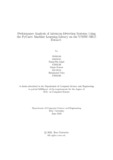| dc.contributor.advisor | Chakrabarty, Amitabha | |
| dc.contributor.author | Abdullah | |
| dc.contributor.author | Iqbal, Faisal Bin | |
| dc.contributor.author | Biswas, Srijon | |
| dc.contributor.author | Urba, Rubabatul | |
| dc.date.accessioned | 2021-12-06T08:01:38Z | |
| dc.date.available | 2021-12-06T08:01:38Z | |
| dc.date.copyright | 2021 | |
| dc.date.issued | 2021-06 | |
| dc.identifier.other | ID 16101305 | |
| dc.identifier.other | ID 17101339 | |
| dc.identifier.other | ID 21141053 | |
| dc.identifier.other | ID 17101426 | |
| dc.identifier.uri | http://hdl.handle.net/10361/15701 | |
| dc.description | This thesis is submitted in partial fulfillment of the requirements for the degree of Bachelor of Science in Computer Science and Engineering, 2021. | en_US |
| dc.description | Cataloged from PDF version of thesis. | |
| dc.description | Includes bibliographical references (pages 36-39). | |
| dc.description.abstract | As one of the fastest growing technologies on earth, the Internet of Things (IoT)
is being embraced almost everywhere. From smart home technology to industrial
automation, IoT is revolutionizing almost everything around us. It has enabled
humans and organizations to do more with less, both in terms of time, as well as -
nances. This feat of the Internet of Things, however, has also led to an alarming rise
in attacks on IoT networks. Among these attacks, botnet intrusions are perhaps the
most worrying ones. And with the advancement of time and technology, attackers
are getting more creative. Hence, it is important to use better and more e cient
machine learning technologies to identify these attacks and detect these intrusions
before they can paralyze the system. This research aims to identify a more e cient
machine learning approach for detecting botnets in IoT networks by utilizing the Py-
Caret machine learning library and analyzing its overall performance. The research
will encompass di erent classi ers and analyze the di erent performance metrics for
each of them. It will also shed light on the feasibility of using the PyCaret library
and how well suited it is for such usage. | en_US |
| dc.description.statementofresponsibility | Abdullah | |
| dc.description.statementofresponsibility | Faisal Bin Iqbal | |
| dc.description.statementofresponsibility | Srijon Biswas | |
| dc.description.statementofresponsibility | Rubabatul Urba | |
| dc.format.extent | 39 pages | |
| dc.language.iso | en | en_US |
| dc.publisher | Brac University | en_US |
| dc.rights | Brac University theses are protected by copyright. They may be viewed from this source for any purpose, but reproduction or distribution in any format is prohibited without written permission. | |
| dc.subject | IoT | en_US |
| dc.subject | Anomaly detection | en_US |
| dc.subject | In- trusion detection | en_US |
| dc.subject | PyCaret | en_US |
| dc.subject | UNSW-NB15 | en_US |
| dc.subject.lcsh | Internet of Things | |
| dc.subject.lcsh | Machine learning | |
| dc.title | Performance analysis of intrusion detection systems using the PyCaret machine learning library on the UNSW-NB15 dataset | en_US |
| dc.type | Thesis | en_US |
| dc.contributor.department | Department of Computer Science and Engineering, Brac University | |
| dc.description.degree | B. Computer Science | |

